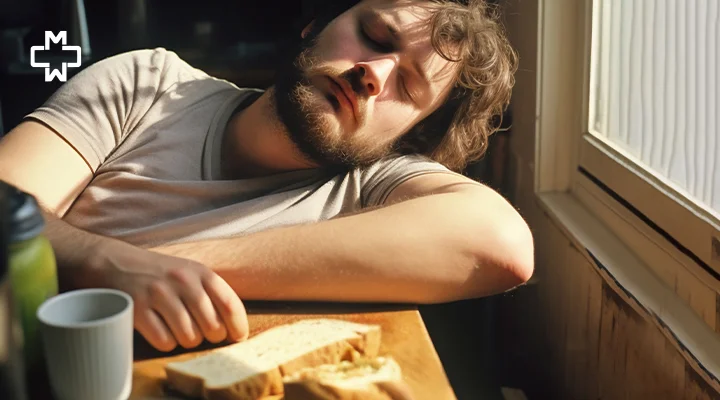Have you ever felt a strong urge to doze off after having a full meal? It’s quite a common experience that many of us go through. But could it also be a sign of something more serious, like diabetes?
Let’s explore the relationship between post-meal drowsiness and diabetes to uncover the truth behind uncontrollable sleepiness after eating.
What is Diabetes?
Diabetes is a chronic metabolic disorder characterized by increased blood glucose levels i.e. sugar in the blood. This condition can arise either because of insufficient insulin production by the pancreas, or the body’s inability to utilize insulin.
Is Falling Asleep After Eating a Sign of Diabetes?
The phenomenon of uncontrollable sleepiness after eating, known as postprandial somnolence, can indeed be associated with diabetes. After consuming food, especially meals high in carbohydrates, the body undergoes a surge in blood glucose levels, leading to a corresponding increase in insulin secretion. This insulin spike can cause a rapid decrease in blood glucose levels, triggering feelings of fatigue and drowsiness.
Other Reasons for Being Sleepy After Eating
- Eating Too Much: Having large meals can overwhelm the digestive system, diverting blood flow away from the brain and causing drowsiness.
- Food Choices: Certain foods, particularly those high in refined carbohydrates and sugars, can cause rapid fluctuations in blood glucose levels, contributing to post-meal sleepiness.
- Dehydration: Inadequate hydration can also lead to feeling tired, worsening the tendency to feel sleepy after eating.
Why People With Diabetes Fall Asleep After Eating?
Individuals with diabetes may experience heightened postprandial somnolence due to their body’s impaired ability to regulate blood glucose levels effectively. Insulin resistance or insufficient insulin production can result in erratic glucose metabolism, leading to pronounced fluctuations in energy levels and increased susceptibility to drowsiness after meals.
How to Know if Sleepiness is Linked to Diabetes?
Anyone who frequently experiences post-meal drowsiness along with other symptoms of diabetes, such as:
- Increased thirst
- Frequent urination
- Unexplained weight loss
- Blurred vision
It is important for them to consult a healthcare professional for a comprehensive evaluation and diagnosis.
Diabetes Symptoms
Listed below are the most commonly reported diabetes symptoms:
- Persistent thirst and hunger
- Frequent urination
- Fatigue
- Unexplained weight loss
- Blurred vision
- Slow wound healing
- Tingling or numbness in the hands or feet
How to Avoid Sleepiness After Eating?
To mitigate postprandial drowsiness and stabilize blood glucose levels, consider implementing the following strategies:
- Opt for balanced meals containing protein, healthy fats, and complex carbohydrates.
- Practice mindful eating and avoid overeating.
- Stay hydrated by drinking water throughout the day.
- Engage in regular physical activity to enhance insulin sensitivity and promote glucose metabolism.
Importance of a Proper Diagnosis
Obtaining a timely and accurate diagnosis of diabetes is crucial for effectively managing the condition and minimizing the risk of complications. Through comprehensive medical assessment and diagnostic testing, healthcare providers can tailor personalized treatment plans to address individual needs and optimize health outcomes.
When to See a Doctor?
If you suspect that your post-meal sleepiness may be indicative of diabetes or if you experience any concerning diabetes symptoms, it’s imperative to schedule a consultation with a healthcare professional promptly. Early intervention and proactive management are key to maintaining optimal health and well-being.
Frequently Asked Questions
Why do diabetics get sleepy after eating?
Diabetics may experience uncontrollable sleepiness after eating due to fluctuating blood glucose levels caused by inadequate insulin regulation.
What does diabetes fatigue feel like?
Diabetes fatigue can manifest as overwhelming tiredness, lack of energy, and difficulty concentrating, often occurring despite adequate rest.
Is sleepiness after eating a sign of insulin resistance?
Yes, sleepiness after eating can be a symptom of insulin resistance, where the body's cells have difficulty responding to insulin, leading to imbalances in blood sugar levels.
– Disclaimer –
This blog is for informational & educational purposes only and does not intend to substitute any professional medical advice or consultation. For any health-related concerns, please consult with your physician, or call 911.
-
About The Author
Dr. Syra Hanif M.D.Board Certified Primary Care Physician
Dr. Syra Hanif is a board-certified Primary Care Physician (PCP) dedicated to providing compassionate, patient-centered healthcare.
Read More







